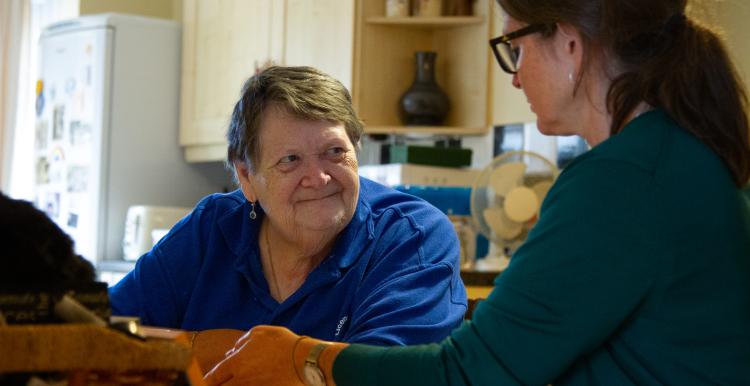Strengthening Reablement Services

Bringing Care Closer to Home
With hospital admissions rising and the complexity of care needs increasing, the search for sustainable, person-centred care has never been more urgent. In response, Greenwich has embraced the Home First initiative, a forward-thinking model that aims to deliver timely support in the comfort of people’s homes, minimising unnecessary hospital stays and enabling recovery in familiar surroundings. Launched in 2020, Home First is more than a shift in setting. It represents a transformation in how care is conceptualised and delivered—one that centres recovery, independence, and the whole person. At the heart of this model sits the reablement service, a short-term, intensive support programme designed not to “do for” people, but to “work alongside” them.
“We want to be proactive rather than reactive. If someone is at risk of losing their independence, we want to get involved as soon as possible and keep them at home for as long as possible”
Over a period of up to six weeks, individuals are supported to regain confidence in daily activities through a personalised, goal-based plan. This empowering approach marks a clear shift from dependency to recovery—and has shown promising results in helping people remain safe, independent, and well in their own homes. But to truly understand how well the service was working in practice, and where it could improve, local leaders knew they needed more than data—they needed to hear directly, and honestly, from the people receiving support.
Why Healthwatch Greenwich Was Asked to Lead a Deep Dive
Recognising the need for candid, first-hand insight, the reablement leadership team commissioned Healthwatch Greenwich to carry out an independent deep dive into people’s experiences of the service. Crucially, this decision was rooted in trust. As the independent champion for residents using health and care services in the borough, Healthwatch Greenwich is well positioned to gather honest, unfiltered feedback from the community—especially on sensitive topics. “People don’t always feel comfortable raising concerns directly with the service providing their care,” explains Deepa Srivastava, Healthwatch Greenwich Research Manager. “There can be real fear that negative feedback might affect their ongoing support or their relationship with key staff. Our independence provides a safe space for people to speak freely, without fear of consequences.”
What emerged was a rich and nuanced picture—one that went far beyond satisfaction scores or ‘friend and family test’ ratings. Residents spoke of feeling empowered and well-supported, but also of moments of confusion, unmet expectations, or uncertainty about what happens after the six-week support ends. These insights offered an additional lens through which the reablement team could examine their service—not just through outcomes, but through experience.
Managing Expectations
Despite the clear benefits of reablement, the journey to recovery following a hospital stay, or serious illness, can be daunting. For many residents, the transition home is accompanied by uncertainty—about what support will look like, how much progress they can realistically expect to make, and what will happen when formal care comes to an end. At such a vulnerable moment, clarity and consistency are essential. And yet, as feedback gathered by Healthwatch Greenwich revealed, this is exactly where gaps often appear. “Residents told us they didn’t always understand what reablement was,” explains Deepa. “Some thought it meant ongoing home care; others weren’t sure how long support would last, or what was expected of them. Carers, too, felt unprepared—unsure how to help or what came next.”
In response, the reablement team introduced a range of improvements. Among them is an information leaflet designed in collaboration with stakeholders to be given at the point of hospital discharge. Written in accessible language, the leaflet explains what the service is, how long it lasts, what types of support are available, and how personal goals are developed. “For many people, this will be the first time they’ve heard of reablement,” says Marco. “So, it’s vital that they start their journey with the right information. With this new leaflet and the guidance around goal setting, they will feel more prepared—and more empowered—right from the start.”
But improving communication with residents is only part of the picture. As Healthwatch Greenwich also highlighted, inconsistencies in how different staff described the service created confusion and anxiety for some families. One resident might be told something by a therapist, another by a care coordinator—and the messages didn’t always align. “The Healthwatch Greenwich report helped us realise that we needed to be more consistent across the whole team,” adds Raj Masina, Service Lead. “If everyone is saying something slightly different, it can erode trust and make residents feel unsure. We’re addressing that head-on.”
Several new initiatives now aim to embed this shared understanding across the workforce. These include a scripted guide for therapists to use when explaining reablement to residents, and workshops on communication and person-centred support for all staff involved in care planning and delivery. The result is a more confident, informed, and unified approach—both for those delivering care, and for those receiving it.
Inclusive Care: Embedding Equity Through Community Insight
Delivering truly person-centred care means recognising and responding to the diverse backgrounds, cultures, and needs of the people using services. But achieving this in practice requires more than good intentions—it demands lived insight, meaningful engagement, and system-wide commitment to inclusion. “Too often, services are designed around a ‘one-size-fits-all’ approach,” explains Joy Beishon, Healthwatch Greenwich Chief Executive Officer. “But people’s experiences of health and care are shaped by their culture, language, beliefs, and identity. If these aren’t acknowledged, care risks becoming not only ineffective, but inequitable.”
Responding to Healthwatch Greenwich recommendations, the reablement team has taken deliberate steps to further embed equity, diversity, and inclusion across the service. “We’ve introduced dedicated training so that all our staff are equipped to support people from a range of backgrounds,” explains Marco. “This includes the Oliver McGowan training around autism and neurodiversity, and we’ve recently achieved our dementia accreditation to ensure our practice is inclusive of cognitive differences too.” The team will also introduce a new quality assurance checklist at the point of initial assessment. This practical tool helps frontline staff better understand each person’s cultural background, language needs, and individual preferences—allowing care to be tailored from the outset. “When the independent living assessor meets with a resident for the first time, that’s now the moment when these important conversations happen,” Marco adds. “We’re not just asking about medical needs—we’re asking how we can make care more personal, respectful, and inclusive.”
Beyond Reablement
While the reablement service provides up to six weeks of personalised, intensive support, recovery rarely follows a neat timeline. For many residents, questions remain: What happens next? Who do I turn to if I still need help? Will I be left to manage alone? These concerns came through clearly in feedback gathered by Healthwatch Greenwich. Residents told us that, while the support received was positive, the transition out of reablement could feel abrupt and disorienting, particularly for those without strong networks or familiarity with local services. In response, the reablement team took action. “We knew we needed to do more to support residents beyond discharge from the service,” says Marco. “The insights from Healthwatch gave us a much clearer understanding of the lived experience—and highlighted where continuity and reassurance were missing.”
As a direct result of this feedback, the service has introduced a more structured, post-reablement support pathway. This includes clearer onward referrals to community groups, therapy programmes, and adult social care teams—meaning that no one is left in limbo once their reablement period ends. It also means a more proactive handover between services, including providing residents with contacts to support services to ensure they feel confident in their ongoing recovery. Crucially, the reablement team maintains contact during this transition phase, not just as a safety net, but as a source of reassurance and encouragement.
“We want residents to feel empowered, not abandoned. Our goal is long-term independence—not a short-term intervention that ends without a clear next step.”
To further strengthen this joined-up approach, the team looks to invest in digital innovation. By improving how patient information is recorded and shared, the service aims to become more responsive and collaborative across health and social care teams. “We’re working on making our records more digital and sharing this within integrated teams,” Marco explains. “This means that teams involved in a resident’s care will have access to real-time data.” This improved digital infrastructure allows practitioners to make more informed decisions quickly. “It’s about providing the right support at the right time, and our digital tools will help us do that more effectively.” Adds Raj.
A Partnership for the Future
Looking ahead, the partnership between Healthwatch Greenwich and the local health and care system is important in shaping services that are not only clinically effective but genuinely person-centred. “We’ve always said that change should be co-produced,” reflects Joy. “People need to see themselves in the services they use. And that means services must remain open to challenge, learning, and change.” As health and care services continue to evolve—embracing digital innovation, integrated working, and inclusive care planning—Healthwatch Greenwich will remain an important contributor in ensuring that these improvements are rooted in what matters most to residents. Because ultimately, better care starts with better listening.
Marco Silvestri works for the Royal Borough of Greenwich as a Service Manager for the Reablement Team, Prisons Social Care Team and the Community Rehabilitation and Short Term Assessment team. He is a qualified Social Worker and has worked for Adult Social Care in Greenwich for nearly thirty years in various teams, including the Community Learning Disability Team, Hospital Social Work Team, and the Community Assessment and Rehabilitation Team. He is passionate about ensuring that good social work practice enables and embeds a strength-based approach in all work so that the voice of the person is clearly heard in order to provide positive outcomes for residents.
Raj Masina is the Service Lead for Greenwich Community Rehab Teams, with a background in Physiotherapy and over 13 years of experience in various acute and community NHS settings. Currently leading the Community Rehab Teams, Raj is passionate about enhancing the user experience by ensuring that rehabilitation is not just a routine process, but a personalised and meaningful journey for each individual. Rather than treating rehab as a set of prescribed exercises or tasks, Raj believes and emphasises engagement and purpose, tailoring rehabilitation to align with a user's goals, interests, and daily life activities, making the process both impactful and motivating.
Image sourced from Age Without Limits library.

